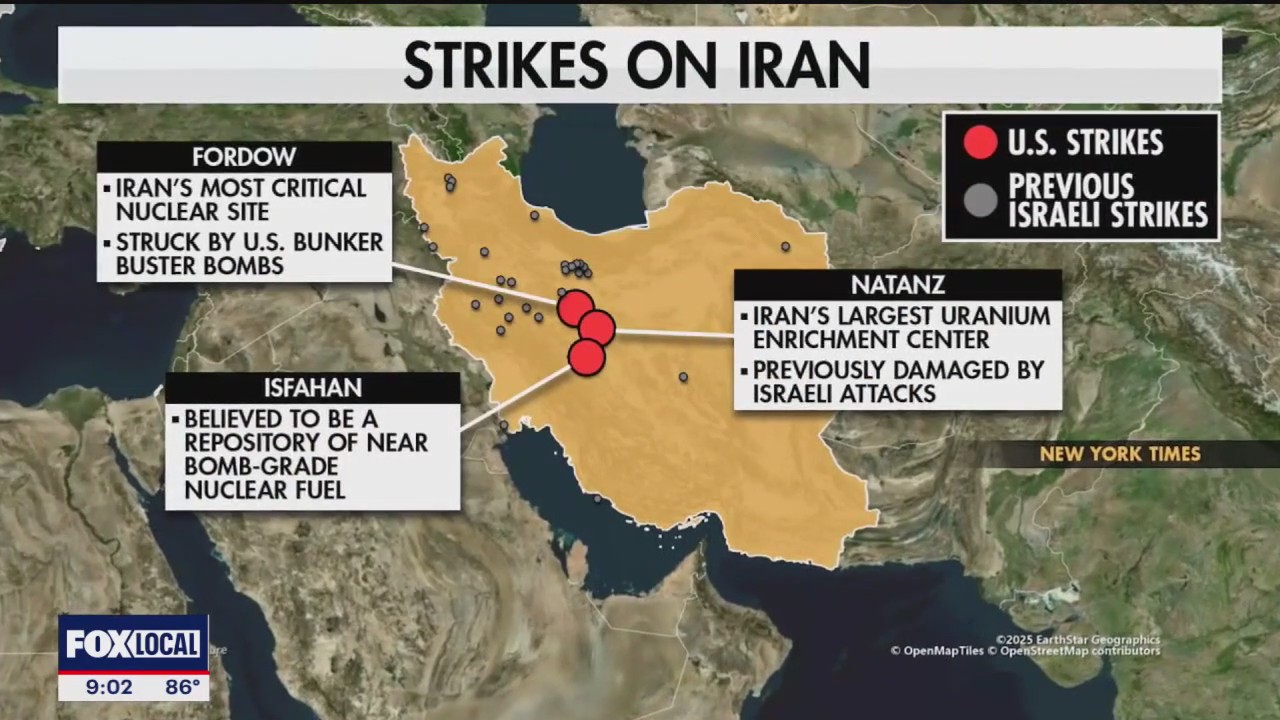U.S. strikes Iran nuclear sites in Operation Midnight Hammer

U.S. strikes Iran nuclear sites in military operation
The U.S. successfully carried out "Operation Midnight Hammer," a large-scale aerial assault using "bunker buster" bombs on three Iranian nuclear sites, with the full impact and Iran's potential retaliation still uncertain, prompting global alerts and expected economic repercussions.
President Trump is signaling a willingness to renew peace talks with Iran as Iran's nuclear program is said to be crippled after three critical nuclear sites were taken out by American bombs in a secretive mission dubbed Operation Midnight Hammer.
The White House says its historic decision is intended to show "peace through strength" as President Donald Trump and his senior advisors called Operation Midnight Hammer a success.
What we know:
The operation targeted three nuclear sites in Iran.
125 U.S. military aircraft were used to support the operation, including bombers, fighters, aircraft refuelers, and surveillance planes.
Leading up to the attack
The backstory:
Newly released satellite images of Iran’s Fordow Nuclear Enrichment Plant show unusual activity in the days leading up to yesterday's U.S. attack.
Vehicles were seen coming and going from the facility that is buried deep in a mountain.
16 cargo trucks were seen along the site’s access road in the pictures from June 19. The very next day, one truck was directly next to the main tunnel entrance.
While the significance of this is not clear, key nuclear locations were reported to have been evacuated at the time.
A new video captured the moment the stealth bombers, which dropped the bombs, returned home.
The B-2 bombers flew back to Whiteman Air Force Base in Missouri. Seven B-2 spirit bombers were used to fly east into Iran. Another group of B-2 bombers were also used to fly west over the Pacific. As we now know, those were decoys.
The total mission was 18 hours.
Retired Marine on Operation Midnight Hammer
What they're saying:
Retired Major General Jim Williams says the operation as a whole is not an unusual operation for the U.S. Military and the bunker buster bombs that were used are effective, but targeting something underground is very difficult.
"So, if you think about mining, mining takes a big effort to dig through a mountain to do coal mining and so forth and so on. So these bombs are effective to a point, but whether they actually destroyed these sites, that's still yet to be seen," said Williams.
Damage assessments are expected to be done while the world waits to see how Iran will respond, but another possibility is that Iran could respond with cyber-attacks or conduct an attack on a U.S. military base outside the Middle East.
Williams says military bases across the country are on high-alert and that vigilance should trickle down to our local communities.
"So, I think you just have to be alert. You know, all of our military folks will have to be alert. Our police officers have to be alert. Our Watch. Neighborhood watches have to be alert."
Williams says it's not out of the question that someone could commit a domestic attack in response to U.S. involvement.
"Now, if you think that you're home and that you're safe, I would say, look right now you are, but I would say pay attention to what's going on, where you are, how you travel, all of those things. Think safety and have a plan, because you never know."
Possible Iran response
Dig deeper:
Ralph Carter is a political science professor at Texas Christian University. He's taught a class focused on conflict in the Middle East for 30 years.
"This regime is scared to make any concessions for fear that they will lose power, and so coming to the negotiating table now, in this humiliating position, is something they will not tolerate."
Carter says he expects Iran counterstrikes in the coming days. He also says Iran could retaliate by closing the Strait of Hormuz. Where 20% of the exported global oil goes through.
Iran's parliament have already taken steps to do just that.
"But it doesn't have to happen if Iran’s leadership decides that a symbolic military response against American interests is sufficient to keep them from being humiliated. So, a sharp but small response might be something they could sell to their own people as well. ‘We struck back at the great Satan.’"
Oil prices
What's next:
Regardless, Carter says the American people should expect oil prices to go up.
"I think what happens next is, I think we will see attacks on US military personnel scattered around the Middle East. I think we will see oil prices go up, as they probably already have today. I think we will see inflation go up, not just in the United States, but globally."
Another question up in the air is will Iran get any help from other global powers like China and Russia...
Both countries condemned the U.S. and the attack. So while the rhetoric is showing some support, it is unclear right now if that support will turn into actual tangible goods.
The Source: Information in this article was provided by an interview conducted by FOX 4's Amelia Jones.

